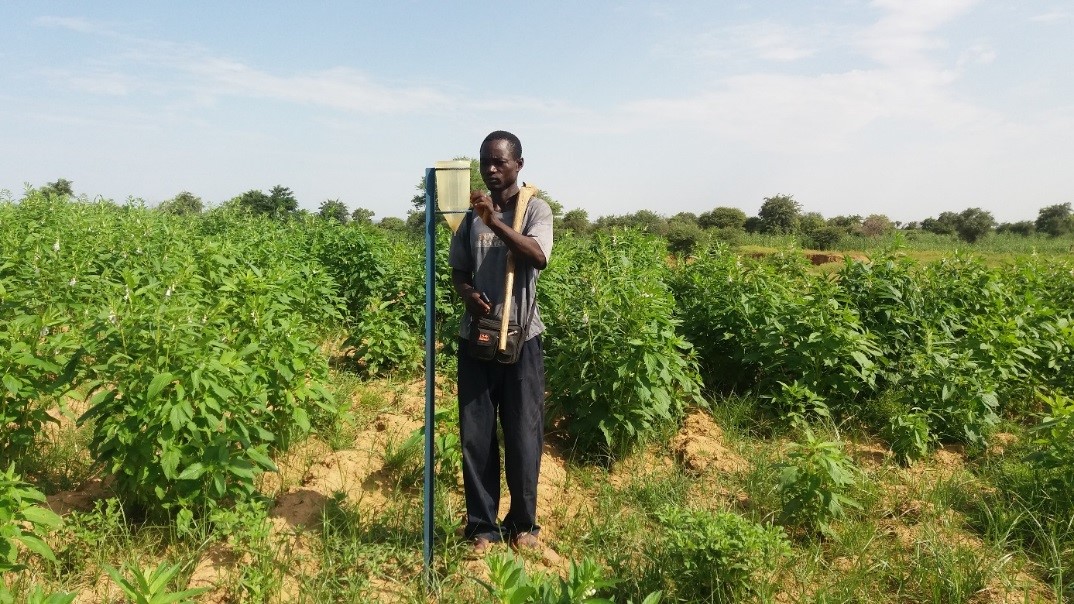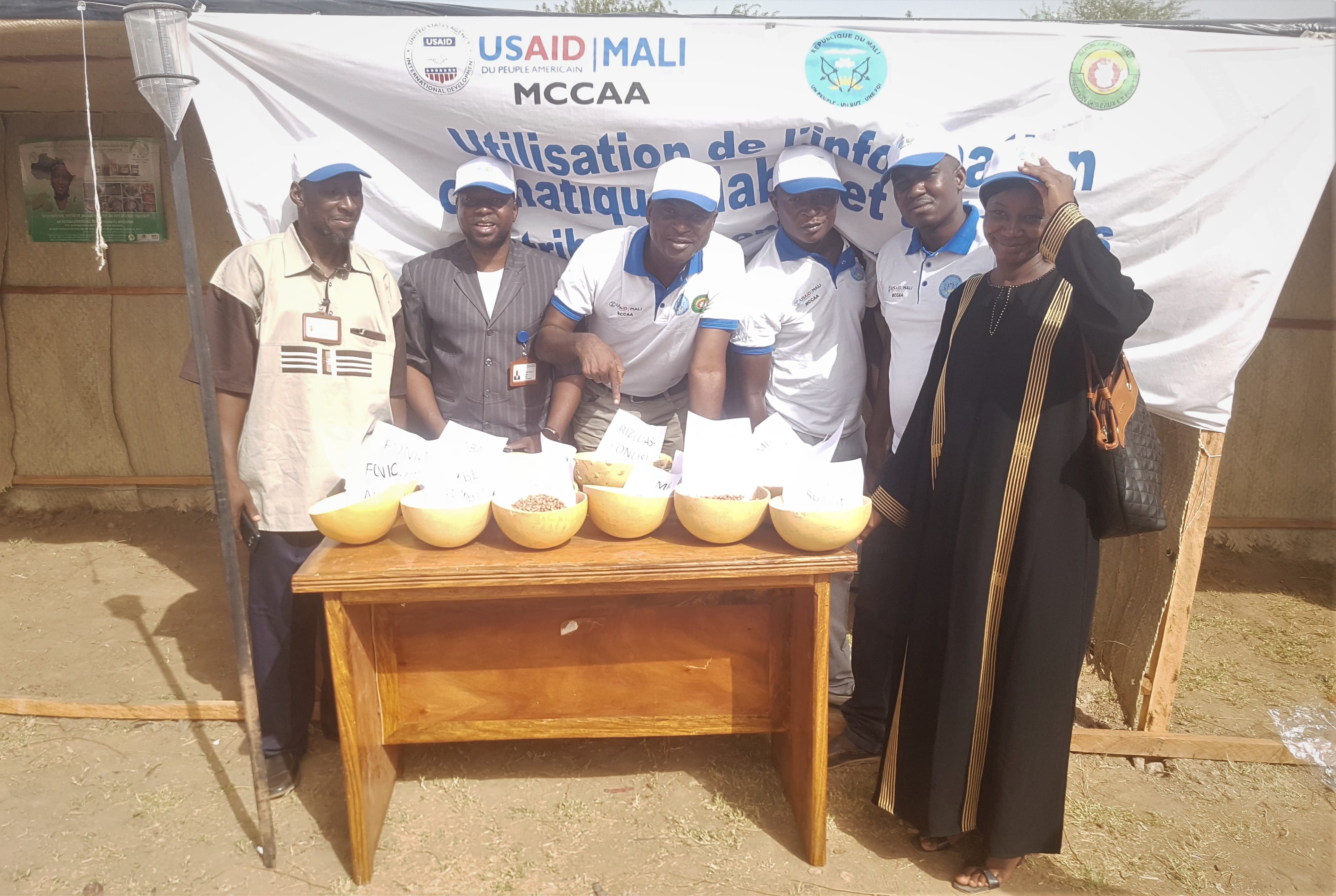Sep 19, 2019 | by Jeff Ratcliffe & Marie-Claire Tuzeneu, Chemonics

Community members in Koporo Pen Commune collect rainfall data using a rain gauge.
As the frequency and magnitude of climate-related hazards increases, these changes are affecting people’s livelihoods, particularly those of rural and vulnerable populations more than ever. In response to this challenge, climate data can be employed in program design to foster greater resilience for livelihoods at the household and community levels.
To strengthen Malian farmers’ resilience to climate and weather variations, it’s not enough to ensure that they have accurate and timely climate information. The farmers must trust in it. By using a three-pronged approach that addresses communities’ trust in, access to, and use of climate information, the USAID Mali Climate Change Adaptation Activity (MCCAA) has helped to provide high-quality climate information to communities, and more importantly, ensure that they apply it. Through its experience, MCCAA has identified three ways that implementers of similar activities can ensure that the communities they serve can trust and apply climate data to its full potential.
During its baseline assessment, MCCAA found that producers significantly distrusted the forecasting produced by the National Meteorological Agency, Mali Météo. So even if producers received accurate and timely climate information, they didn’t trust the quality of climate data — and more importantly, they didn’t use this data to inform their decisions, such as deciding which crops to plant and when.
Much of this distrust stemmed from community members’ misunderstanding of weather forecasts and key forecast-related concepts, such as probabilities and percentages. A climate forecast is a tool — but a tool that isn’t always accurate. If a forecast predicts a 90 percent chance of rain, for example, there is a 10 percent chance that it won’t rain, and there’s also a chance that the level of rainfall will vary within the area covered by a forecast. One part of a town or village may see heavy rainfall, while another area may only receive a light sprinkle. To help communities understand this variation in the accuracy of climate information, MCCAA distributed three rain gauges per village, each placed in a different location across the village. MCCAA then trained rain gauge committees in each village to monitor the rain gauges and record the information, raising awareness among community members on variations in rainfall within a village and helping them make more informed decisions on where to invest community time and resources.

The MCCAA team shares the project’s approach for fostering more resilient livelihoods at a World Environment Day event.
While working with rain gauge committees to improve communities' trust in climate information, MCCAA partnered with Mali Météo to support the creation of a tool to improve community members' access to regular and actionable climate data. In 2017, Mali Météo developed and launched the AGROMET toolbox. This system has a web interface for Mali Météo’s internal use and a smartphone application for public use. The application allows users to receive a forecast for the next day via their smart phones. Users also have access to other pertinent information, such as wind and anticipated weather events, nomadic movements, and the state of crops. Using AGROMET, Mali Météo sends advice about which seeds to plant and when, depending on the seasonal forecast.
Through the AGROMET toolbox, villagers actively participate in collecting and improving the accuracy of the forecasts that they in turn receive from Mali Météo. Each rain gauge committee completes a rainfall data reporting form and transmits that form to Mali Météo. Rain gauges linked to the AGROMET toolbox offer the ability to transmit this information electronically. This creates a feedback loop between climate information end-users and Mali Météo to continually improve local forecasts and climate information services. By having these rain gauge committees serve as data collection points for Mali Météo, not only can Mali Météo verify and refine its forecasting algorithms, but community members have greater understanding of the forecasting process and are empowered to take ownership of its role in their livelihoods. This further improves trust in — and ultimately use of — climate data.
By the end of the project’s fourth year, households in MCCAA-supported villages reported much greater trust in the quality of daily climate information as well as significantly higher rates of perceived usefulness of training on climate information. By building knowledge, improving access, and increasing citizen engagement, implementers of agricultural and climate change adaptation projects can ensure that climate data is not only available, but that it is used to its full potential. Ultimately, these efforts can contribute to community resilience in the face of climate change.
Join speakers Jeff Ratcliffe and Laura Glaeser from Chemonics, Tanya Boudreau the Food Economy Group and Meera Sawkar from Geopoll at the 2019 SEEP Annual Conference, where they will together explore How Data Can Help Design Climate Resilient Programs on October 22 at the Crystal Gateway Marriott in Arlington, VA.
Jeff Ratcliffe is an adaptation and resilience expert with over 20 years of experience, including 10 years as country director or chief of party on USAID and other donor-funded activities in Mali, Niger, Nigeria, Rwanda, Democratic Republic of Congo, Sierra Leone, and Liberia. He is currently the chief of party on the USAID Mali Climate Change Adaptation Activity, implemented by Chemonics. His expertise includes establishing M&E systems, building capacity through grants, and working with and through local counterparts in insecure and rural areas. A former Niger Peace Corps volunteer, Mr. Ratcliffe holds a M.A. in humanitarian services administration from the University of Connecticut, and a M.P.A. and B.A. in history from the University of Utah.
Marie-Claire Tuzeneu, currently a project manager for Chemonics’ West and Central Africa and Haiti division, is an international development professional with over seven years of experience in climate change policy analysis, project technical and operational management, research, and communications. Ms. Tuzeneu holds an Master’s in International Economic Policy from the Paris Institute of Political Science and a B.A. in International Studies and French from the University of Dayton.
Categories: Food Security Livelihoods Technology Blog Agriculture & Food Security Blog WebinarsBlogs

1621 North Kent Street, Ste 900,
Arlington, VA, 22209
P 202.534.1400
F 703.276.1433
Website Photos: © mari matsuri
